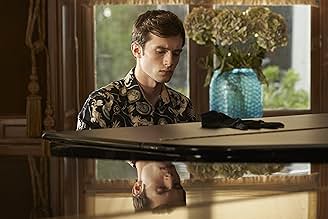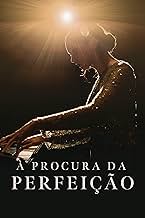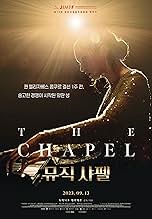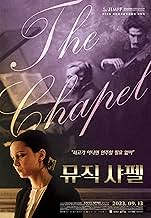Twenty three year old virtuoso pianist Jennifer Rogiers has been living with a terrible secret most of her life. When she enters the world famous Queen Elisabeth competition the memory of a ... Read allTwenty three year old virtuoso pianist Jennifer Rogiers has been living with a terrible secret most of her life. When she enters the world famous Queen Elisabeth competition the memory of a traumatic childhood experience surfaces again.Twenty three year old virtuoso pianist Jennifer Rogiers has been living with a terrible secret most of her life. When she enters the world famous Queen Elisabeth competition the memory of a traumatic childhood experience surfaces again.
- Awards
- 2 nominations total
Lydia Indjova
- Ivanka Berkov
- (as Lidya Indjova)
Yuka Hashimoto
- Mamiko Kawamoto
- (as Yuika Hashimoto)
Oscar Louis Högström
- Frank Braily
- (as Oscar Högström)
- Director
- Writer
- All cast & crew
- Production, box office & more at IMDbPro
Storyline
Featured review
The Chapel is the new film of director Dominique Deruddere. 2022 was a great year for Flemish films with acclaimed works such as Close, Le otto montagne, Zillion and Rebel, and I was looking forward to see if the first high profile release of the new year could maintain this hot streak. The synopsis further piqued my interest: Jennifer Rogiers (Taeke Nicolaï) is one of 12 virtuoso pianists that are finalists for the world famous Queen Elisabeth competition. She and the 11 others have to stay in total isolation in the titular 'Chapel' for one week as they prepare for their performance in the final. While in seclusion, Jennifer is forced to confront her inner demons as well as deal with the tensions that arise between these competitors all striving for the same goal.
Although the concept is an intriguing one, the movie doesn't exactly take it into unexplored territories. Through flashbacks that are interwoven with Jennifer's time at the Chapel, we get glimpses of Jennifer's relation with her overbearing mother (Ruth Becquart), who is quick to notice her 8-year-old prodigious talent and pushes her to the limit in order to maximize her potential. Jennifer's father (Kevin Janssens) on the other hand, doesn't want his daughter spending so much time behind the piano and seems to resent the elitism associated with classical music. While these flashbacks look good (especially the recurring shot of a young Jennifer going outside in pyjamas on a cold winter night has a haunting quality to it), they don't really do enough to flesh out these characters. The pushy, over-ambitious mother that wants to live her own dreams through her child and the alcoholic, abusive father aren't exactly original character types and after the first three flashbacks, I felt like I knew everything I needed to know about them.
Another aspect I had some issues with is how the interactions between the finalists at the Chapel are being portrayed. Tensions inside the Chapel are understandably high, but I feel like this stressful environment could have been explored in a more interesting way. There is one character whose sole purpose seems to be to befriend Jennifer, despite Jennifer repeatedly denying her attempts at reaching out. This makes her feel less like a real character than a plot device (one interaction with Jennifer seems to hint a some repressed sexuality, but this is never further explored). And Nazarenko, Jennifer's main rival, also feels like a bit of a caricature, right from the moment he enters The Chapel in dramatic fashion and addresses the journalists in a laughably pompous manner. The mind games he plays with Jennifer feel especially transparent, although I guess it makes sense for her to be affected by his remarks and apparent unassailability, given her own fragile state of mind. And Jennifer does very much seem like a person headed towards a nervous breakdown as the final comes closer, as is demonstrated in a rather ill-advised night sequence right before her performance.
The single-minded pursuit of perfection at the expense of mental health is a well-explored theme that brings to mind modern masterpieces like Whiplash and Black Swan. There are especially some parallels to be made with that latter one (lead girl with fragile psyche gets big break, deals with inner demons and a controlling mother, free-spirited friend helps her let loose etc.), but Black Swan digs so much deeper into its protagonist psychologically (and does it with much more visual bravura), that the character examination at the heart of The Chapel seems almost basic in comparison.
It all leads up of course to Jennifer's performance in the final of the Queen Elisabeth competition and this is a stand-out sequence. Jennifer's piano play is intercut at a fast pace with the aforementioned winter night flashback, as both stories build towards their respective conclusions. Again, the central flashback is handled beautifully from a visual standpoint, but left me scratching my head a bit storywise.
Despite there being some flaws in the storytelling and some parts that didn't work for me, I didn't think The Chapel was a bad film overall. The cinematography does a great job of contrasting the warm colors of the present day scenes with the colder looking flashbacks. The art design inside the eponymous Chapel as well as the costumes are beautiful. And Taeke Nicolaï has great screen presence in her first lead role, giving us a sense of both Jennifer's inner turmoil and fears as well as her perseverance and determination. The editing is also remarkable in that final sequence. Director Deruddere has a clear idea of the story he wants to tell and he achieves it. The story just isn't especially original and you end up wishing Deruddere had just dug a little deeper. Overall, it's a decent film, that doesn't really go in directions where other, better films haven't gone before (and beyond).
Although the concept is an intriguing one, the movie doesn't exactly take it into unexplored territories. Through flashbacks that are interwoven with Jennifer's time at the Chapel, we get glimpses of Jennifer's relation with her overbearing mother (Ruth Becquart), who is quick to notice her 8-year-old prodigious talent and pushes her to the limit in order to maximize her potential. Jennifer's father (Kevin Janssens) on the other hand, doesn't want his daughter spending so much time behind the piano and seems to resent the elitism associated with classical music. While these flashbacks look good (especially the recurring shot of a young Jennifer going outside in pyjamas on a cold winter night has a haunting quality to it), they don't really do enough to flesh out these characters. The pushy, over-ambitious mother that wants to live her own dreams through her child and the alcoholic, abusive father aren't exactly original character types and after the first three flashbacks, I felt like I knew everything I needed to know about them.
Another aspect I had some issues with is how the interactions between the finalists at the Chapel are being portrayed. Tensions inside the Chapel are understandably high, but I feel like this stressful environment could have been explored in a more interesting way. There is one character whose sole purpose seems to be to befriend Jennifer, despite Jennifer repeatedly denying her attempts at reaching out. This makes her feel less like a real character than a plot device (one interaction with Jennifer seems to hint a some repressed sexuality, but this is never further explored). And Nazarenko, Jennifer's main rival, also feels like a bit of a caricature, right from the moment he enters The Chapel in dramatic fashion and addresses the journalists in a laughably pompous manner. The mind games he plays with Jennifer feel especially transparent, although I guess it makes sense for her to be affected by his remarks and apparent unassailability, given her own fragile state of mind. And Jennifer does very much seem like a person headed towards a nervous breakdown as the final comes closer, as is demonstrated in a rather ill-advised night sequence right before her performance.
The single-minded pursuit of perfection at the expense of mental health is a well-explored theme that brings to mind modern masterpieces like Whiplash and Black Swan. There are especially some parallels to be made with that latter one (lead girl with fragile psyche gets big break, deals with inner demons and a controlling mother, free-spirited friend helps her let loose etc.), but Black Swan digs so much deeper into its protagonist psychologically (and does it with much more visual bravura), that the character examination at the heart of The Chapel seems almost basic in comparison.
It all leads up of course to Jennifer's performance in the final of the Queen Elisabeth competition and this is a stand-out sequence. Jennifer's piano play is intercut at a fast pace with the aforementioned winter night flashback, as both stories build towards their respective conclusions. Again, the central flashback is handled beautifully from a visual standpoint, but left me scratching my head a bit storywise.
Despite there being some flaws in the storytelling and some parts that didn't work for me, I didn't think The Chapel was a bad film overall. The cinematography does a great job of contrasting the warm colors of the present day scenes with the colder looking flashbacks. The art design inside the eponymous Chapel as well as the costumes are beautiful. And Taeke Nicolaï has great screen presence in her first lead role, giving us a sense of both Jennifer's inner turmoil and fears as well as her perseverance and determination. The editing is also remarkable in that final sequence. Director Deruddere has a clear idea of the story he wants to tell and he achieves it. The story just isn't especially original and you end up wishing Deruddere had just dug a little deeper. Overall, it's a decent film, that doesn't really go in directions where other, better films haven't gone before (and beyond).
- laurenspierre
- Feb 9, 2023
- Permalink
- How long is The Chapel?Powered by Alexa
Details
Box office
- Gross worldwide
- $15,206
- Runtime1 hour 36 minutes
- Color
Contribute to this page
Suggest an edit or add missing content













